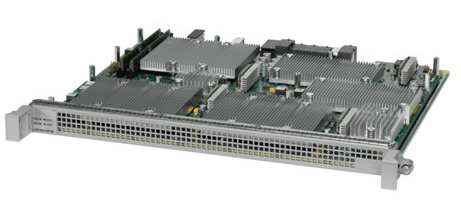Cisco ASR1000-ESP100= network equipment spare part Interface processor
- Brand: Cisco
- Category:
- SKU: ASR1000-ESP100=
- EAN: 0882658501142
ASR 1000 Embedded Services Processor 100Gbps, Spare
Offer details
Trade Prices
| Distributor | Product | SKU | Stock | Updated | Price |
|---|---|---|---|---|---|

|
Processor ASR1000 Ebbedded | ASR1000-ESP100= | |||

|
CISCO ASR1000 EMBEDDED SERVICES | CG00704 | |||
| Ingram Micro CS | CISCO ASR1000 EMBEDDED SERVICES | CG00704 | |||

|
ASR 1000 Series Embedded Services Processor 100Gbps - Control processor - plug-in module | 3087129 |
Retail Prices
| Merchant | Product | Condition | Updated | Price |
|---|---|---|---|---|
| Amazon | Used | £6,743.52 | ||
| Amazon | New | £21,159.94 |
Related Products
Description
The Cisco® ASR 1000 Series Embedded Services Processors (ESPs) handle all the network data-plane traffic‑processing tasks of Cisco ASR 1000 Series Aggregation Services Routers. These ESPs allow the activation of concurrent enhanced network services, such as cryptography, firewall, Network Address Translation (NAT), quality of service (QoS), NetFlow, and many others while maintaining line speeds. Figure 1 shows the Cisco ASR 1000 Series ESP 100 and ESP 200.
Cisco ASR 1000 Series Routers are placed at the WAN edge of your enterprise data center or large office, as well as in service provider points of presence (POPs). The routers rely on the power of the ESPs to aggregate multiple traffic flows and network services, including encryption and traffic management, and forward them across WAN connections at line speeds. With router options that run from 2.5 to 200 Gbps, the Cisco ASR Family contains many models and licensing options to meet the speed and budget requirements of different types of organizations and various-sized locations.
The Cisco ASR 1000 ESP components of these routers accelerate service delivery using parallel processing. The ESPs are based on the Cisco Flow Processor (FP) for next-generation forwarding and queuing in silicon. They operate at 20-, 40-, 100-, and 200-Gbps data-plane forwarding throughput rates. Together, the Cisco ASR 1001-X, ASR 1001-HX, ASR 1002-HX, and ASR 1002-X Routers and 100- and 200-Gbps ESPs introduce the second generation of the Cisco FP hardware and software architecture. With FP-based ESPs at their core, ASR 1000 Routers accomplish the following:
- Handle all baseline packet routing operations, including MAC address classification, Layer 2 and Layer 3 forwarding, QoS classification, and NetFlow packet accounting
- Perform advanced services such as IP Security (IPsec) encryption, Network Address Translation (NAT), firewall, AppNav, Cisco Application Visibility and Control (AVC), Performance Routing (PfR), and Locator ID Separation Protocol (LISP); they offer diverse feature Layer 2 connectivity options such as Ethernet over MPLS (EoMPLS), Virtual Private LAN Services (VPLS), Overlay Transport Virtualization (OTV), and Virtual Extensible LAN Services (VXLAN)
Features and Benefits
The main engine of the ESP is the Cisco FP, the industry’s first programmable and application-aware network processor. The Cisco FP forms the overall hardware and software architecture of the ESP. It consolidates up to 256 customized packet-processor cores (900 MHz to 1.5 GHz) into a single processor. The parallel processing capability eliminates the need for additional service blades inside the router, because all processing is performed on the FP. As a result, the ESPs enable the ASR 1000s to support the following functions and features with high performance:
- Forwarding, traffic management, and services
- Large-scale parallel processing with centralized shared memory to achieve low-latency packet processing
- High-performance deep-packet inspection (DPI) with full visibility into the entire Layer 2 frame, including payload
- Rapid feature development with ANSI-C software development framework
- Up to 200-Gbps system throughput and up to 130 millions of packets per second (mpps) to address WAN aggregation needs
- Hardware-assisted cryptographic performance to yield up to 78 Gbps of throughput to enable secure WAN access and compliance
- Line-speed zone-based firewall that provides up to 200 Gbps of throughput and 6-mpps firewall sessions
- DPI, Cisco IOS® Software Zone-Based Firewall distributed denial of service (DDoS) detection and prevention, and control-plane protection
- Cisco Session Border Control (SBC) for terminating and interconnecting media terminations with full accounting and flow control
- Cisco Multicast Visual Quality Experience (VQE) and video Call Admission Control (CAC) for enhanced user experiences
- Hardware-accelerated traffic classification and traffic shaping with support for up to 464,000 queues
- Flexible traffic prioritization and efficient WAN bandwidth use with minimum, maximum, and excess bandwidth allocation with priority propagation
Cisco ASR 1000 Series Routers are placed at the WAN edge of your enterprise data center or large office, as well as in service provider points of presence (POPs). The routers rely on the power of the ESPs to aggregate multiple traffic flows and network services, including encryption and traffic management, and forward them across WAN connections at line speeds. With router options that run from 2.5 to 200 Gbps, the Cisco ASR Family contains many models and licensing options to meet the speed and budget requirements of different types of organizations and various-sized locations.
The Cisco ASR 1000 ESP components of these routers accelerate service delivery using parallel processing. The ESPs are based on the Cisco Flow Processor (FP) for next-generation forwarding and queuing in silicon. They operate at 20-, 40-, 100-, and 200-Gbps data-plane forwarding throughput rates. Together, the Cisco ASR 1001-X, ASR 1001-HX, ASR 1002-HX, and ASR 1002-X Routers and 100- and 200-Gbps ESPs introduce the second generation of the Cisco FP hardware and software architecture. With FP-based ESPs at their core, ASR 1000 Routers accomplish the following:
- Handle all baseline packet routing operations, including MAC address classification, Layer 2 and Layer 3 forwarding, QoS classification, and NetFlow packet accounting
- Perform advanced services such as IP Security (IPsec) encryption, Network Address Translation (NAT), firewall, AppNav, Cisco Application Visibility and Control (AVC), Performance Routing (PfR), and Locator ID Separation Protocol (LISP); they offer diverse feature Layer 2 connectivity options such as Ethernet over MPLS (EoMPLS), Virtual Private LAN Services (VPLS), Overlay Transport Virtualization (OTV), and Virtual Extensible LAN Services (VXLAN)
Features and Benefits
The main engine of the ESP is the Cisco FP, the industry’s first programmable and application-aware network processor. The Cisco FP forms the overall hardware and software architecture of the ESP. It consolidates up to 256 customized packet-processor cores (900 MHz to 1.5 GHz) into a single processor. The parallel processing capability eliminates the need for additional service blades inside the router, because all processing is performed on the FP. As a result, the ESPs enable the ASR 1000s to support the following functions and features with high performance:
- Forwarding, traffic management, and services
- Large-scale parallel processing with centralized shared memory to achieve low-latency packet processing
- High-performance deep-packet inspection (DPI) with full visibility into the entire Layer 2 frame, including payload
- Rapid feature development with ANSI-C software development framework
- Up to 200-Gbps system throughput and up to 130 millions of packets per second (mpps) to address WAN aggregation needs
- Hardware-assisted cryptographic performance to yield up to 78 Gbps of throughput to enable secure WAN access and compliance
- Line-speed zone-based firewall that provides up to 200 Gbps of throughput and 6-mpps firewall sessions
- DPI, Cisco IOS® Software Zone-Based Firewall distributed denial of service (DDoS) detection and prevention, and control-plane protection
- Cisco Session Border Control (SBC) for terminating and interconnecting media terminations with full accounting and flow control
- Cisco Multicast Visual Quality Experience (VQE) and video Call Admission Control (CAC) for enhanced user experiences
- Hardware-accelerated traffic classification and traffic shaping with support for up to 464,000 queues
- Flexible traffic prioritization and efficient WAN bandwidth use with minimum, maximum, and excess bandwidth allocation with priority propagation
Specifications
| Features | |
|---|---|
| Product type | Interface processor |
| Compatible products | Cisco ASR 1002, 1004, 1006 |
| Operational conditions | |
| Operating temperature (T-T) | 5 - 40 °C |
| Storage temperature (T-T) | -40 - 70 °C |
| Operating relative humidity (H-H) | 5 - 90% |
| Storage relative humidity (H-H) | 5 - 95% |









